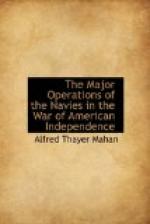By their dexterity and vigilance each admiral had thwarted the other’s aims. Rodney, by a pronounced, if cautious, offensive effort, had absolutely prevented the “ulterior object” of the French, which he clearly understood to be Santa Lucia. De Guichen had been successful in avoiding decisive action, and he had momentarily so crippled a few of the British ships that the fleet must await their repairs before again taking the sea. The tactical gain was his, the strategic victory rested with his opponent; but that his ships also had been much maltreated is shown by the fact that half a dozen could not put to sea three weeks later. The French admiral broke down under the strain, to which was added the grief of losing a son, killed in the recent engagements. He asked for his recall. “The command of so large a fleet,” he wrote, “is infinitely beyond my capacity in all respects. My health cannot endure such continual fatigue and anxiety.” Certainly this seems a tacit testimony to Rodney’s skill, persistence, and offensive purpose. The latter wrote to his wife: “For fourteen days and nights the fleets were so near each other that neither officers nor men could be said to sleep. Nothing but the goodness of the weather and climate would have enabled us to endure so continual a fatigue. Had it been in Europe, half the people must have sunk under it. For my part, it did me good.”
Rodney stated also in his home letters that the action of his subordinates in the last affairs had been efficient; but he gave them little credit for it. “As I had given public notice to all my captains, etc., that I expected implicit obedience to every signal made, under the certain penalty of being instantly superseded, it had an admirable effect; as they were all convinced, after their late gross behaviour, that they had nothing to expect at my hands but instant punishment to those who neglected their duty. My eye on them had more dread than the enemy’s fire, and they knew it would be fatal. No regard was paid to rank: admirals as well as captains, if out of their station, were instantly reprimanded by signals, or messages sent by frigates; and, in spite of themselves, I taught them to be, what they had never been before,—officers.” Rodney told his officers also that he would shift his flag into a frigate, if necessary, to watch them better. It is by no means obligatory to accept these gross aspersions as significant of anything worse than the suspiciousness prevalent throughout the Navy, traceable ultimately to a corrupt administration of the Admiralty. The latter, like the government of 1756, was open to censure through political maladministration; every one feared that blame would be shifted on to him, as it had been on to Byng,—who deserved it; and not only so, but that blame would be pushed on to ruin, as in his case. The Navy was honeycombed with distrust, falling little short of panic. In this state of apprehension and doubt, the tradition




